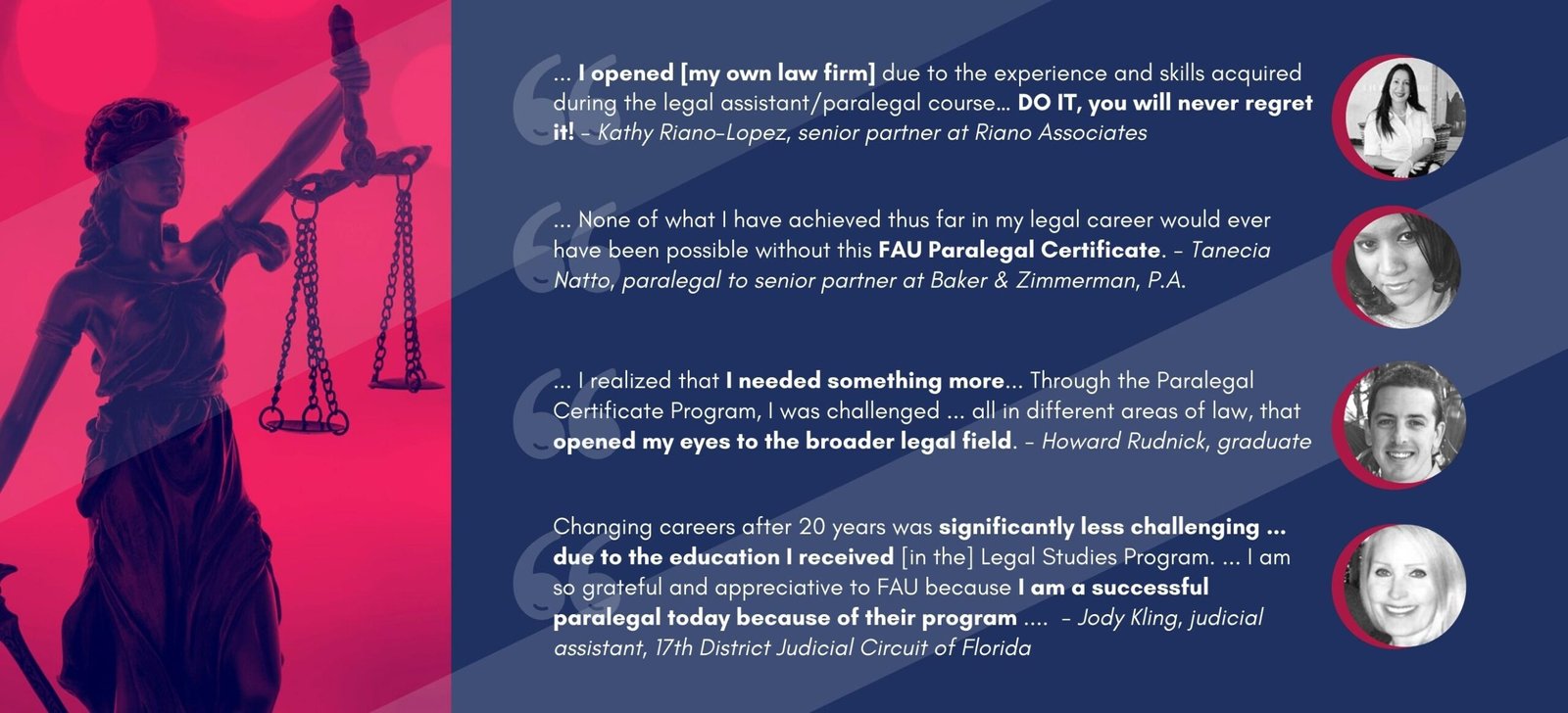Requirements to become a paralegal in Florida

A paralegal in Florida, also known as a legal assistant, is a professional who works in the legal field under the direct supervision of an attorney. Paralegals are not authorized to offer legal services directly to the public, but they play a crucial role in supporting lawyers with a wide range of tasks.
These tasks may include legal research, preparation of legal documents, litigation assistance, file organization and communication with clients.
Paralegals are critical to the efficient operation of law firms, corporate legal departments and other organizations requiring legal services.
How to Become a Paralegal in Florida: Requirements
- Education:
- Associate’s Degree in Paralegal Studies: Many paralegals in Florida begin their career with an associate’s degree in paralegal studies from an accredited institution.
- Certificate Programs: Alternatively, those with a university degree in another area may opt for a certificate program in paralegal studies.
- ABA Approved Programs: It is recommended that degree or certificate programs be approved by the American Bar Association (ABA) to ensure the quality and relevance of the education.
- Practical Experience:
- Internship or Work Experience: Practical experience gained through internships or employment in a legal environment is highly beneficial and is often required by employers.
- Key Skills:
- Research and Writing Skills: Paralegals must be skilled in legal research and document drafting.
- Legal Knowledge: Must have a good understanding of legal terms and procedures.
- Organizational and Technological Skills: Organization and proficiency in various legal applications and software are essential.
- Voluntary Certification:
- Professional Certifications: Although not a mandatory requirement in Florida, obtaining professional certification, such as that offered by the National Association of Legal Assistants (NALA) or the National Federation of Paralegal Associations (NFPA), can improve employment prospects and professional credibility.
- Continuing Education:
- Courses and Workshops: Keeping up to date with the latest trends and changes in the law is crucial, so many paralegals participate in continuing education courses and workshops.
- State Regulations:
- Comply with Local Regulations: It is important to be aware of any specific regulations or requirements that may exist in Florida for the practice of the paralegal profession.
Becoming a paralegal in Florida involves a combination of formal education, practical experience and specific skill development. Although a specific license is not required to practice as a paralegal, education and certification can play a crucial role in success and career advancement in this field.
Steps to follow to become a Paralegal
If you have already determined that you meet the requirements to become a paralegal and are determined to pursue this career, here are the steps to follow:
1. Obtain an Adequate Education.
In Florida, there are a variety of educational institutions where you can study to become a paralegal. These institutions offer associate degree, bachelor’s degree, and certificate programs in paralegal studies. Some of the most outstanding options include:
- State and Community Colleges and Universities:
- Miami Dade College: Offers an Associate of Science in Paralegal Studies program.
- Valencia College: Provides an associate degree program in paralegal studies.
- Broward College: Offers an Associate of Science in Paralegal Studies program.
- Private Universities and Technical Schools:
- Keiser University: Has associate’s and bachelor’s degree programs in paralegal studies.
- Nova Southeastern University: Offers a bachelor’s degree program in paralegal studies.
- South University in Tampa: Provides programs in paralegal studies.
- Online Programs:
- Many universities and colleges offer online or hybrid programs, which can be convenient if you are working or have other commitments.
- Specialized Training Centers:
- Florida Paralegal Institute: As you mentioned, this institute offers specialized courses in paralegal training.
- Universities with ABA Accredited Programs:
- University of Central Florida: Offers paralegal programs accredited by the American Bar Association (ABA).
- St. Louis St. Petersburg College: It also has programs accredited by the ABA.
2. Acquire Practical Experience:
- Internships: Seek internship opportunities in law firms, corporate legal departments, government agencies or the court system.
- Entry Level Work: Consider entry level positions in the legal field to gain practical experience.
3. Develop Key Skills:
- Technical Skills: Learn to use legal software, databases and research tools.
- Communication and Writing Skills: Improve your communication and writing skills, which are essential for drafting legal documents and interacting with clients and legal professionals.
4. Obtain Certifications:
- Voluntary Certifications: Explore certifications offered by organizations such as the National Association of Legal Assistants (NALA) or the National Federation of Paralegal Associations (NFPA).
5. Job Search:
- Prepare a Resume and Cover Letter: Create a resume and cover letter highlighting your education, skills and experience.
- Networking: Utilize your network of contacts, including professors, classmates, and professionals you have worked with during your internship.
6. Continuing Education and Professional Development:
- Continuing Education: Keep up to date with the latest developments in the legal field through seminars, workshops and courses.
- Join Professional Associations: Consider joining professional associations to access resources, networking opportunities and continuing education.
7. Consider Specializations:
- Areas of Specialization: Think about areas of law that particularly interest you, such as corporate law, immigration or criminal law, and look for opportunities to specialize.
8. Maintain Ethical and Professional Standards:
- Professional Ethics: Make sure you understand and follow the codes of ethics applicable to paralegals in your jurisdiction.
9. Plan a Long-Term Career Path:
- Career Objectives: Establish long-term career objectives. Consider furthering your education or even pursuing a law degree if your goal is to become a lawyer.
By following these steps, you will be well on your way to launching and developing a successful career as a paralegal, making the most of your skills and education in this dynamic and challenging field.
Advantages and disadvantages of the profession
Being a paralegal is a professional career with its own benefits and challenges. Here are the good and bad things about being a paralegal:
The Good Thing About Being a Paralegal
- High Labor Demand:
- Paralegals are in high demand in many legal sectors, offering job stability and multiple employment opportunities.
- Diversity at Work:
- As a paralegal, you will face a wide variety of tasks and challenges, making every day different and exciting.
- Learning Opportunities:
- Working in a legal environment offers the opportunity to constantly learn about different aspects of law and develop valuable skills.
- Possibility of Specialization:
- Paralegals can specialize in specific areas of law, such as immigration, criminal or corporate law, which can increase their value in the job market.
- Personal Satisfaction:
- Assisting in the resolution of legal cases and contributing to justice can be very rewarding and offer great personal satisfaction.
- Competitive Salary:
- Many paralegals enjoy competitive salaries, with opportunities for raises and bonuses based on their experience and expertise.
The Downside of Being a Paralegal
- Stress and Tight Deadlines:
- Legal work often involves tight deadlines and complex cases, which can create stress and pressure.
- Heavy Work Loads:
- Paralegals can face heavy workloads, especially in law firms with many active cases.
- Limitations in Legal Practice:
- As a paralegal, you are limited in the tasks you can perform. You cannot represent clients in court or give legal advice, which can be frustrating for some.
- Dependence on the Legal Market:
- Demand for paralegals can fluctuate with the legal and economic market, which can affect job security.
- Career Advancement Challenges:
- Although there are opportunities for growth, in some cases, advancement may be limited without additional education, such as a law degree.
- Continuing Education Requirements:
- Keeping up to date with constant changes in the law and regulations requires an ongoing commitment to education and professional development.
In summary, being a paralegal offers a challenging and rewarding career in the legal field with good employment opportunities and constant learning. However, it can also involve stress and limitations in terms of what can be done within the legal system. The decision to pursue this career should be based on a balanced assessment of these positive and negative aspects.






